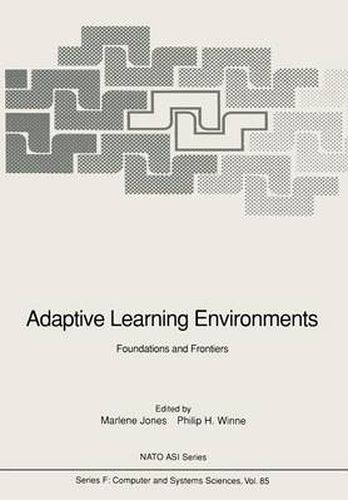Readings Newsletter
Become a Readings Member to make your shopping experience even easier.
Sign in or sign up for free!
You’re not far away from qualifying for FREE standard shipping within Australia
You’ve qualified for FREE standard shipping within Australia
The cart is loading…






This title is printed to order. This book may have been self-published. If so, we cannot guarantee the quality of the content. In the main most books will have gone through the editing process however some may not. We therefore suggest that you be aware of this before ordering this book. If in doubt check either the author or publisher’s details as we are unable to accept any returns unless they are faulty. Please contact us if you have any questions.
Adaptive Learning Environments (ALEs) can be viewed as the intersection of two traditionally distinct areas of research: instructional science and
computer science. They encompass intelligent tutoring systems, interactive learning environments, and situated learning environments. There
is increasing interest in effective instructional systems
from education, industry, military and government sectors. Given recent advances in hardware architecture and reduction of hardware costs, the time is right to define the next steps in research and development of
ALEs. This book is an outgrowth of the presentations and discussions
that took place at the NATO Advanced Study Institute held at the University of Calgary in July 1990. It contains chapters from both researchers in
instructional science and researchers in computer science on the
following topics: - Systems and architectures for instruction -
Representing curriculum and designing instructional tasks - Environments to support learning - Diagnosing students’ learning and adjusting plans
for instruction - Models of students’ metacognition, motivation and
learning strategies - Student-system interactions. The book containsintroductions/critiques of each pair of chapters, and a final chapter
discusses the synthesis of instructional science and computer science.
$9.00 standard shipping within Australia
FREE standard shipping within Australia for orders over $100.00
Express & International shipping calculated at checkout
Stock availability can be subject to change without notice. We recommend calling the shop or contacting our online team to check availability of low stock items. Please see our Shopping Online page for more details.
This title is printed to order. This book may have been self-published. If so, we cannot guarantee the quality of the content. In the main most books will have gone through the editing process however some may not. We therefore suggest that you be aware of this before ordering this book. If in doubt check either the author or publisher’s details as we are unable to accept any returns unless they are faulty. Please contact us if you have any questions.
Adaptive Learning Environments (ALEs) can be viewed as the intersection of two traditionally distinct areas of research: instructional science and
computer science. They encompass intelligent tutoring systems, interactive learning environments, and situated learning environments. There
is increasing interest in effective instructional systems
from education, industry, military and government sectors. Given recent advances in hardware architecture and reduction of hardware costs, the time is right to define the next steps in research and development of
ALEs. This book is an outgrowth of the presentations and discussions
that took place at the NATO Advanced Study Institute held at the University of Calgary in July 1990. It contains chapters from both researchers in
instructional science and researchers in computer science on the
following topics: - Systems and architectures for instruction -
Representing curriculum and designing instructional tasks - Environments to support learning - Diagnosing students’ learning and adjusting plans
for instruction - Models of students’ metacognition, motivation and
learning strategies - Student-system interactions. The book containsintroductions/critiques of each pair of chapters, and a final chapter
discusses the synthesis of instructional science and computer science.